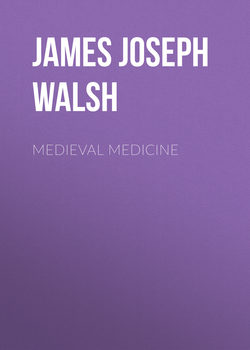Medieval Medicine

Реклама. ООО «ЛитРес», ИНН: 7719571260.
Оглавление
James Joseph Walsh. Medieval Medicine
PREFACE
MEDIEVAL MEDICINE
CHAPTER I. INTRODUCTORY
CHAPTER II. EARLY MEDIEVAL MEDICINE
CHAPTER III. SALERNO AND THE BEGINNINGS OF MODERN MEDICAL EDUCATION
CHAPTER IV. MONTPELLIER AND MEDICAL EDUCATION IN THE WEST
CHAPTER V. LATER MEDIEVAL MEDICINE
CHAPTER VI. MEDIEVAL SURGEONS: ITALY
CHAPTER VII. SURGEONS OUTSIDE OF ITALY: SURGEONS OF THE WEST OF EUROPE
CHAPTER VIII. ORAL SURGERY AND THE MINOR SURGICAL SPECIALITIES
CHAPTER IX. MEDICAL EDUCATION FOR WOMEN
CHAPTER X. MEDIEVAL HOSPITALS
CHAPTER XI. MEDIEVAL CARE OF THE INSANE
APPENDIX I
APPENDIX II
Отрывок из книги
To understand the story of Medieval Medicine, the reader must recall briefly the course of Roman history. Rome, founded some eight centuries before Christ, was at first the home of a group of adventurers who, in the absence of women enough to supply wives for their warriors, went out and captured the maidens of a neighbouring Sabine town. The feud which broke out as a result was brought to an end by the women now become the wives of the Romans, and an alliance was made. Gradually Rome conquered the neighbouring cities, but was ever so much more interested in war and conquest than in the higher life. The Etruscan cities, which came under her domination, now reveal in their ruins art objects of exquisite beauty and the remains of a people of high artistic culture. When Rome conquered Carthage, Carthage was probably the most magnificent city in the world, and Rome was a very commonplace collection of houses. Culture did not come to Rome until after her conquest of Greece, when “captive Greece led her captor captive.”
Sir Henry Maine’s expression that whatever lives and moves in the intellectual life is Greek in origin may not be unexceptionably true, but it represents a generalization of very wide application.
.....
He paid particular attention to diseases of the nervous system, and discussed headache at some length. Chronic or recurrent headache he attributed to diseases of the brain, plethora, biliousness, digestive disturbances, insomnia, and prolonged worry. Hemicrania he thought due to the presence of toxic materials, though it was also connected with abdominal disorders, especially in women. Alexander has much to say of the paralytic and epileptic conditions, and recommended massage, rubbings, baths, and warm applications for the former, and emphasized the need for careful directions as to the mode of life, and special attention to the gastro-intestinal tract, in the latter. A plain, simple diet, with regular bowels, he considers the most important basis for any successful treatment of epilepsy. Besides, he recommended baths, sexual abstinence, and regular exercise. He rejected treatment of the condition by surgery of the head, either by trephining or by incisions or by cauterization. His teaching is that of those who have had most experience with the disease in our own time. For sore throat he prescribes gargles or light astringents at the beginning, and stronger astringents, alum and soda dissolved in water, later in the case.
He particularly emphasized that trust should not be placed in any single method of treatment. Every available means of bringing relief to the patient should be tried. “The duty of the physician is to cool what is hot, to warm what is cold, to dry what is moist, and to moisten what is dry. He should look upon the patient as a besieged city, and try to rescue him with every means that art and science placed at his command. The physician should be an inventor, and think out new ways and means by which the cure of the patient’s affection and the relief of his symptoms may be brought about.” The most important factor in Alexander’s therapeutics is his diet. Watering-places and various forms of mineral waters, as well as warm baths and sea baths, are constantly recommended by him. He took strong ground against the use of many drugs, and the rage for operating. The prophylaxis of disease is in Alexander’s opinion the important part of the physician’s duty. His treatment of fever shows the application of his principle: cold baths, cold compresses, and a cooling diet, were his favourite remedies. He encouraged diaphoresis nearly always, and gave wine and stimulating drugs when the patient was very weak.
.....